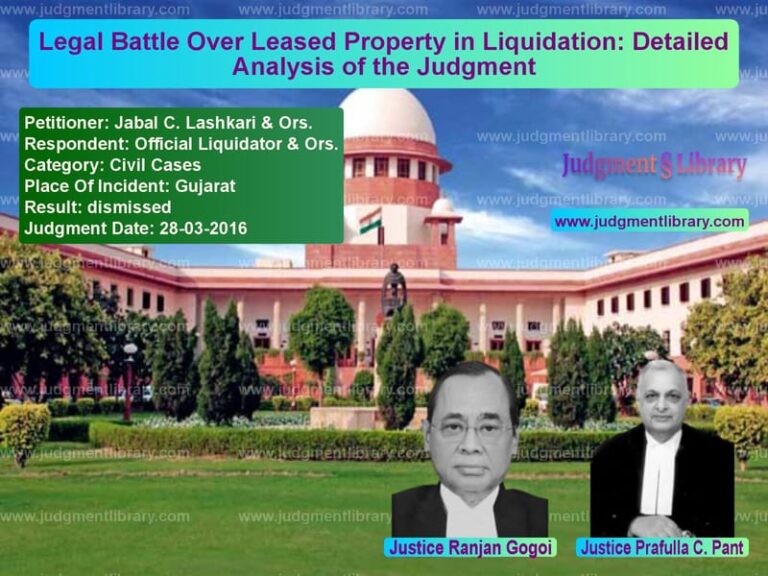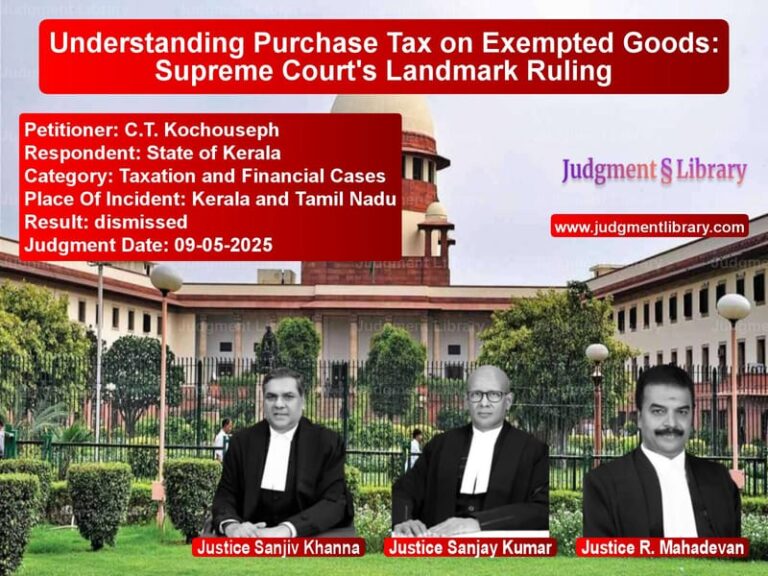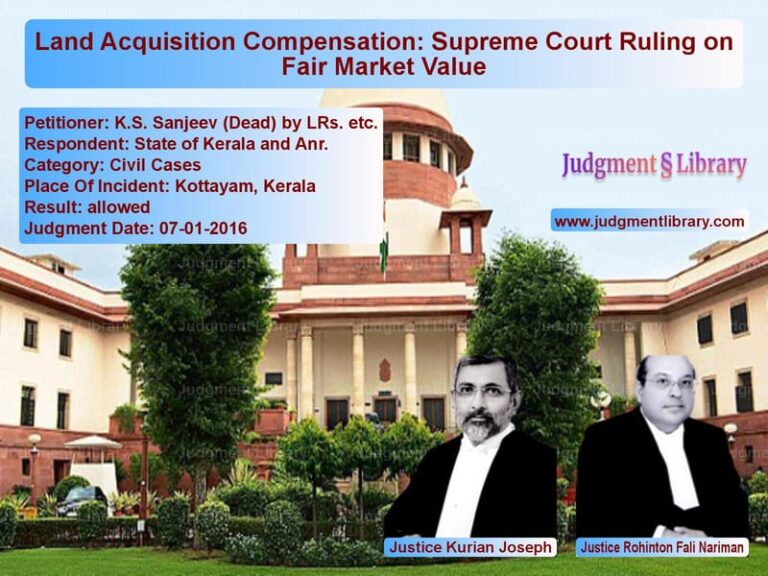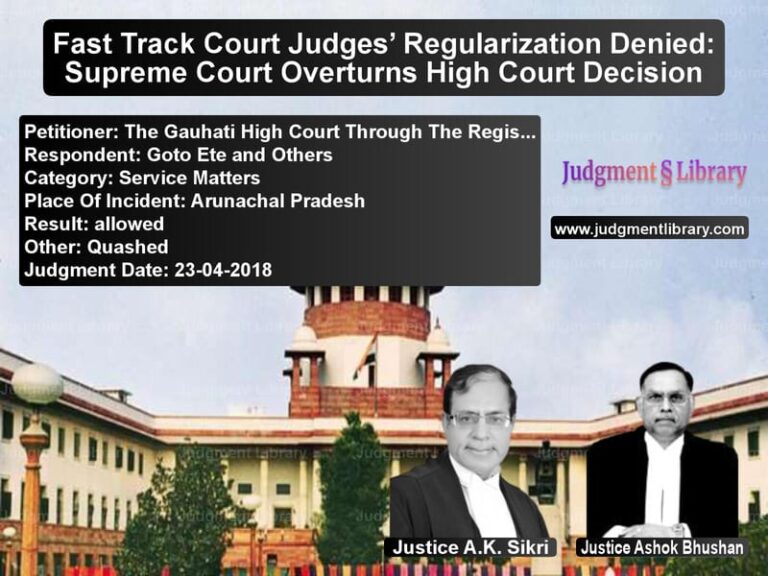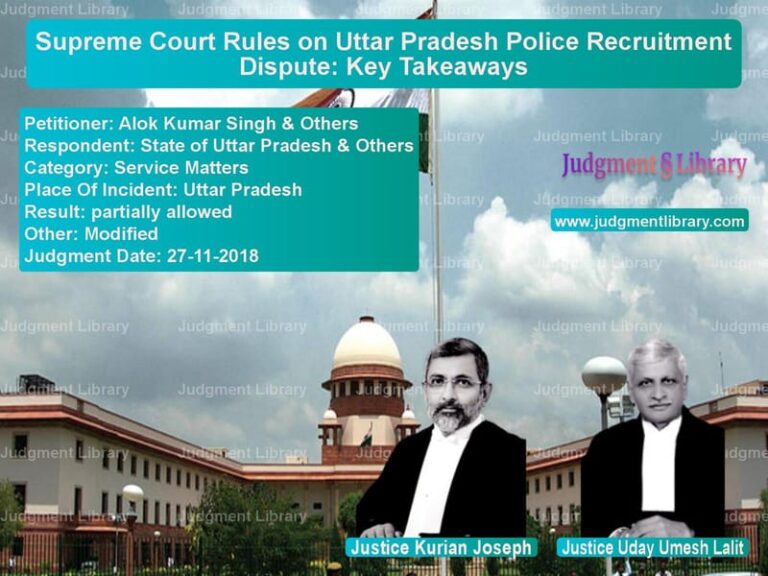Supreme Court Directs Compliance with Labor Tribunal Award in Mangilal Jatav’s Employment Case
The Supreme Court of India has issued a significant ruling in the case of Mangilal Jatav vs. Union of India & Ors., addressing an employment dispute where the petitioner sought reinstatement and compensation following an award by the Central Government Industrial Tribunal-cum-Labour Court in Jabalpur, Madhya Pradesh. The case sheds light on critical issues regarding labor rights, the enforceability of tribunal decisions, and the judicial system’s role in ensuring justice for workers.
Background of the Case
The petitioner, Mangilal Jatav, filed a writ petition under Article 32 of the Indian Constitution, seeking specific reliefs due to non-compliance with a labor tribunal’s order. His plea included:
- A writ of mandamus directing the respondents to act on his representation dated June 2, 2016.
- Reinstatement as a workman in his former employment.
- Payment of Rs. 1,00,000/- (One Lakh Rupees) in compensation, as awarded by the Central Government Industrial Tribunal-cum-Labour Court on May 6, 2016.
The petitioner contended that despite a favorable ruling from the labor tribunal, the respondents failed to comply with the award, forcing him to approach the Supreme Court for relief.
Legal Issues Raised
This case raised several important legal issues:
- Enforceability of labor court awards: The delay in compliance with the tribunal’s decision highlighted the need for stronger enforcement mechanisms.
- Role of constitutional remedies: Whether the Supreme Court should intervene in a labor dispute under Article 32 was a key consideration.
- Employer obligations: The responsibility of employers in honoring labor tribunal judgments was examined.
Arguments by the Petitioner
The petitioner argued that his fundamental rights were being violated due to the inaction of the respondents. His key contentions included:
- That he had been wrongfully terminated from employment without just cause.
- That the Central Government Industrial Tribunal-cum-Labour Court had ruled in his favor and awarded compensation.
- That despite the tribunal’s binding decision, the respondents had failed to honor the award.
- That he had submitted a formal representation to the authorities on June 2, 2016, requesting compliance, but no action had been taken.
Based on these facts, he sought the Supreme Court’s intervention to ensure that justice was served.
Arguments by the Respondents
The respondents countered by arguing:
- That the petitioner’s claims were administrative in nature and did not warrant the Supreme Court’s intervention under Article 32.
- That due process was being followed and any delay in compliance was unintentional.
- That enforcement of the labor tribunal’s order should be handled through execution proceedings in the appropriate forum.
Supreme Court’s Observations
The bench, comprising Justice Kurian Joseph and Justice Rohinton Fali Nariman, acknowledged that while the Supreme Court does not usually entertain employment disputes under Article 32, the circumstances of the case warranted its intervention.
The Court observed:
“Having regard to the peculiar facts and taking note of the fact that the Award dated 06.05.2016 for payment of compensation of Rs.1,00,000/- (Rupees One Lac) has not been honored by the respondents, for which a representation is stated to be pending with the respondents, we dispose of this writ petition with a direction to the competent authority of the respondents to take appropriate action for honoring the Award, in case the same has otherwise attained finality, positively within a period of one month from the date of production of a copy of this judgment along with a copy of the writ petition.”
The Court emphasized the importance of honoring tribunal decisions, stressing that failure to comply with such awards undermines the very foundation of labor justice.
Key Takeaways from the Judgment
- Judicial oversight in labor disputes: The Supreme Court’s intervention in this case underscores its role in ensuring the enforcement of labor rights.
- Employer accountability: The ruling reinforces the responsibility of employers to comply with tribunal orders.
- Timely enforcement: The Court’s directive for compliance within one month highlights the need for swift action in labor cases.
Impact on Labor Law and Employment Rights
This judgment has significant implications for labor law and employment rights in India:
- It establishes a precedent for workmen seeking judicial enforcement of labor tribunal awards.
- It highlights the need for prompt compliance with tribunal decisions to prevent unnecessary litigation.
- It reiterates the constitutional guarantee of fair treatment and due process for employees.
Conclusion
The Supreme Court’s ruling in Mangilal Jatav vs. Union of India & Ors. reaffirms the judiciary’s commitment to upholding workers’ rights. By directing the respondents to comply with the labor tribunal’s award within a month, the Court sent a clear message that tribunal decisions must be respected and enforced in a timely manner.
For employees facing similar challenges, this case serves as a reminder that the judiciary remains a powerful ally in the fight for labor justice. The decision also underscores the importance of enforcing labor laws effectively to ensure that workers receive the compensation and protections they are entitled to under the law.
Don’t miss out on the full details! Download the complete judgment in PDF format below and gain valuable insights instantly!
Download Judgment: Mangilal Jatav vs Union of India & Ors Supreme Court of India Judgment Dated 21-11-2016.pdf
Direct Downlaod Judgment: Direct downlaod this Judgment
See all petitions in Employment Disputes
See all petitions in Termination Cases
See all petitions in Pension and Gratuity
See all petitions in Judgment by Kurian Joseph
See all petitions in Judgment by Rohinton Fali Nariman
See all petitions in allowed
See all petitions in supreme court of India judgments November 2016
See all petitions in 2016 judgments
See all posts in Service Matters Category
See all allowed petitions in Service Matters Category
See all Dismissed petitions in Service Matters Category
See all partially allowed petitions in Service Matters Category


